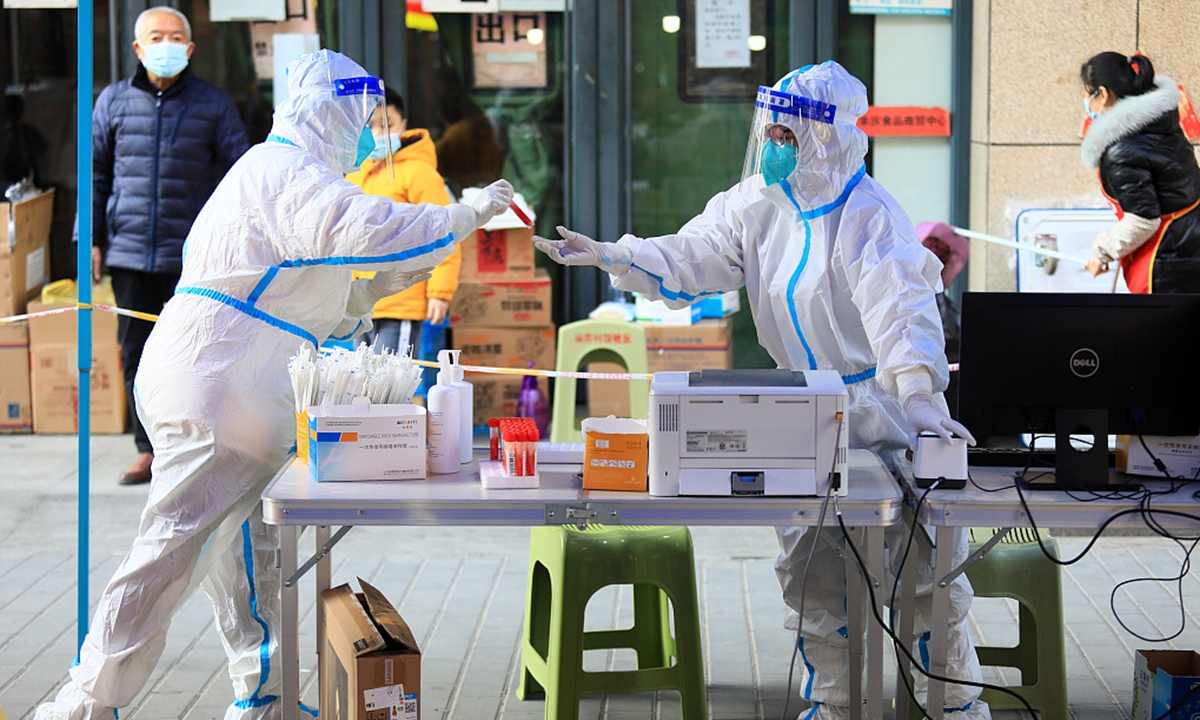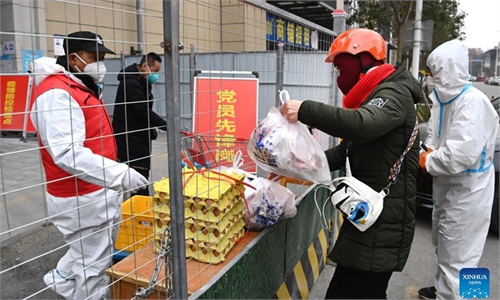
Medical staff conduct nucleic acid tests in a community in Xi'an, Shaanxi Province. Photo: VCG
Officials in Xi'an, capital city of Northwest China's Shaanxi Province, which is fighting China's worst COVID-19 outbreak since Wuhan, said on Monday they are working to rectify loopholes in services that local people had been complaining about in some of the city's quarantine areas.
Shaanxi reported 92 locally transmitted COVID-19 cases on Sunday, accounting for the majority of the national tally of 101 on the same day, and 90 of them were found in Xi'an, according to China's National Health Commission.
Since December 9, total of 1,690 locally transmitted cases have been reported in the province, including 1,663 in Xi'an, the Shaanxi provincial health commission said on Monday.
As of 4 pm Monday, there were 387 quarantine areas in the city, and 39,473 residents were under quarantine, said officials at a press conference on Monday. They admitted that there were loopholes in providing daily supplies in the quarantine work due to hasty arrangements.
Some Xi'an residents in quarantine used social media platforms such as the Twitter-like Sina Weibo to complain that they had difficulties buying food and other daily necessities. A video of a Xi'an resident in Yanta district who went out to buy steamed buns and was thus beaten up by epidemic control personnel went viral on Sunday.
At the conference, officials said that Yanta has been allocating and transporting some 3,400 tons of vegetables from surrounding provinces and cities to meet residents' basic needs since Saturday.
A special price inspection team was also set up to ensure stable prices during the outbreak.
A total of 59 drug stores are open with relevant personnel running errands to make sure that the public can get medicine supplies.
Also, a medical squad set up by 12 community health service centers was told to provide basic medical services to residents and a WeChat group especially for medical aid services is also open, with ambulances standing by to provide timely transfers of patients in need.
Some said that there is a one-size-fits-all quarantine policy in the city. Despite it being clearly stated in documents that some special groups, including pregnant women, could apply for home quarantine, they were all sent to the quarantine sites, causing great inconvenience.
On Sunday, Xi'an announced that two senior Party officials from the city's Yanta district had been removed from their posts, and a deputy mayor concurrently serving as district Party chief to strengthen local anti-virus work, local media reported.
Liu Guozhong, the Party chief of Shaanxi, called on Sunday for prioritizing epidemic prevention and control in urban villages in Xi'an, while vowing to reach the goal of clearing cases as soon as possible, media reported.
Liu said that the situations in the urban villages were complicated and there was a great risk of spreading the epidemic, which makes these areas key and difficult points for epidemic control and prevention.
Liu stressed that there should be an accelerated move to quarantine people with high infection risks and complete surveys within the regulated time to identify the close contacts of infected people. Liu ordered full preparations for these isolation facilities, as well supplies in these places and vehicles to assist the transfers.
It is of great importance to take epidemic prevention and control and the smooth running of daily supplies into consideration at the same time. Attention should be given to people's medical needs such as the purchase of medicines, and to designating hospitals to serve urban villages and quarantine areas as well as green channels to help transfer the patients, Liu said.
Liu also called on governments of all levels to draw lessons from the Yanta and Gaoxin districts.
Global Times

